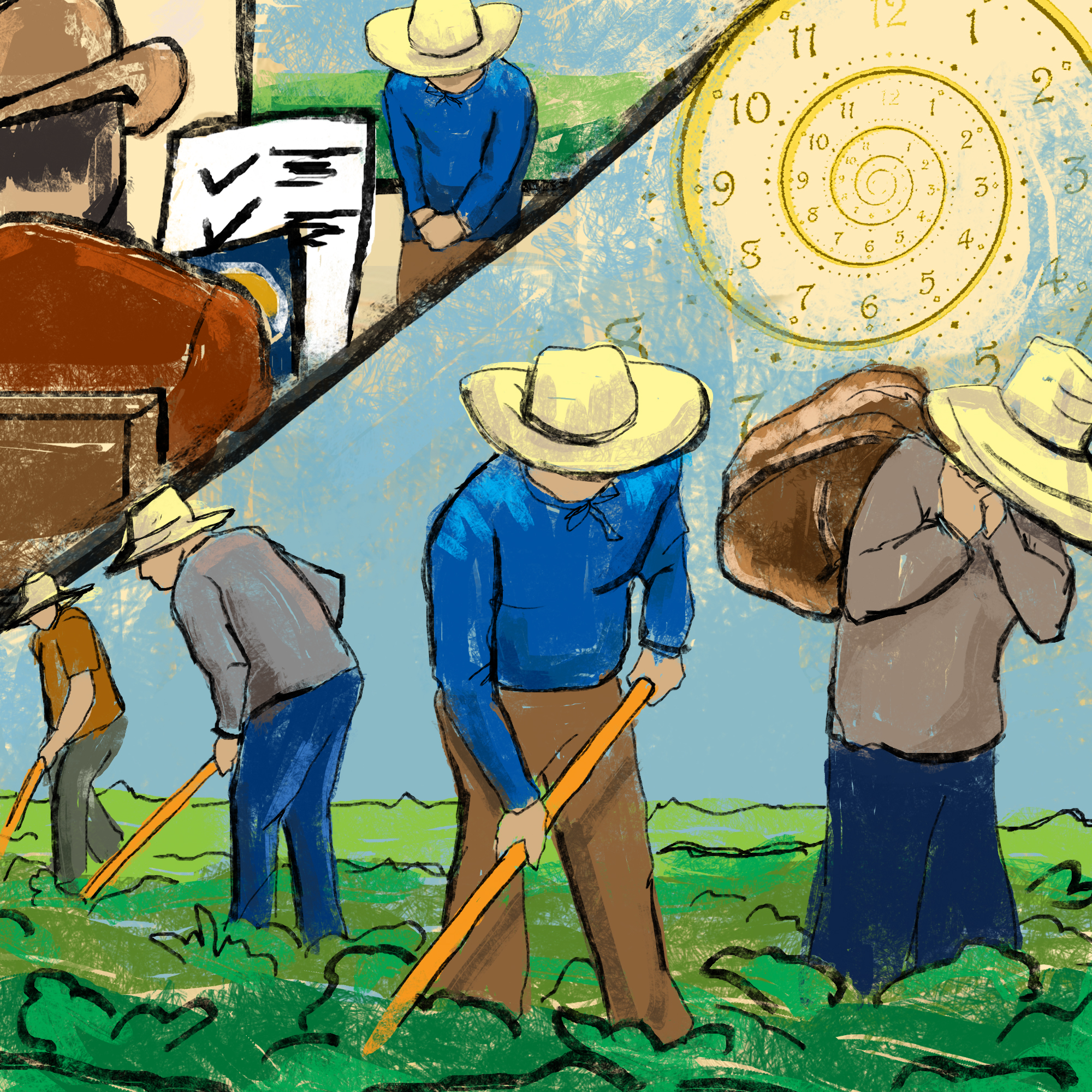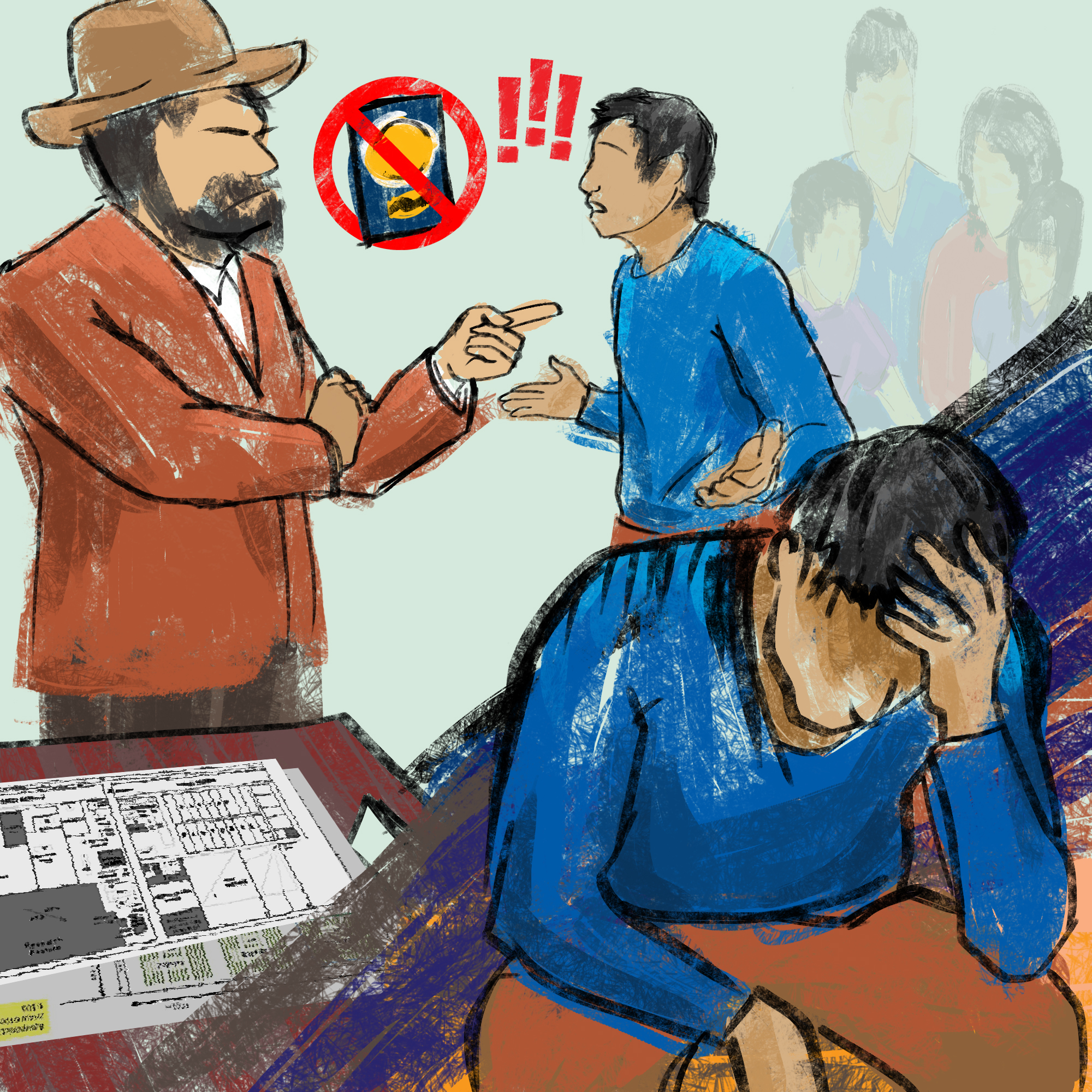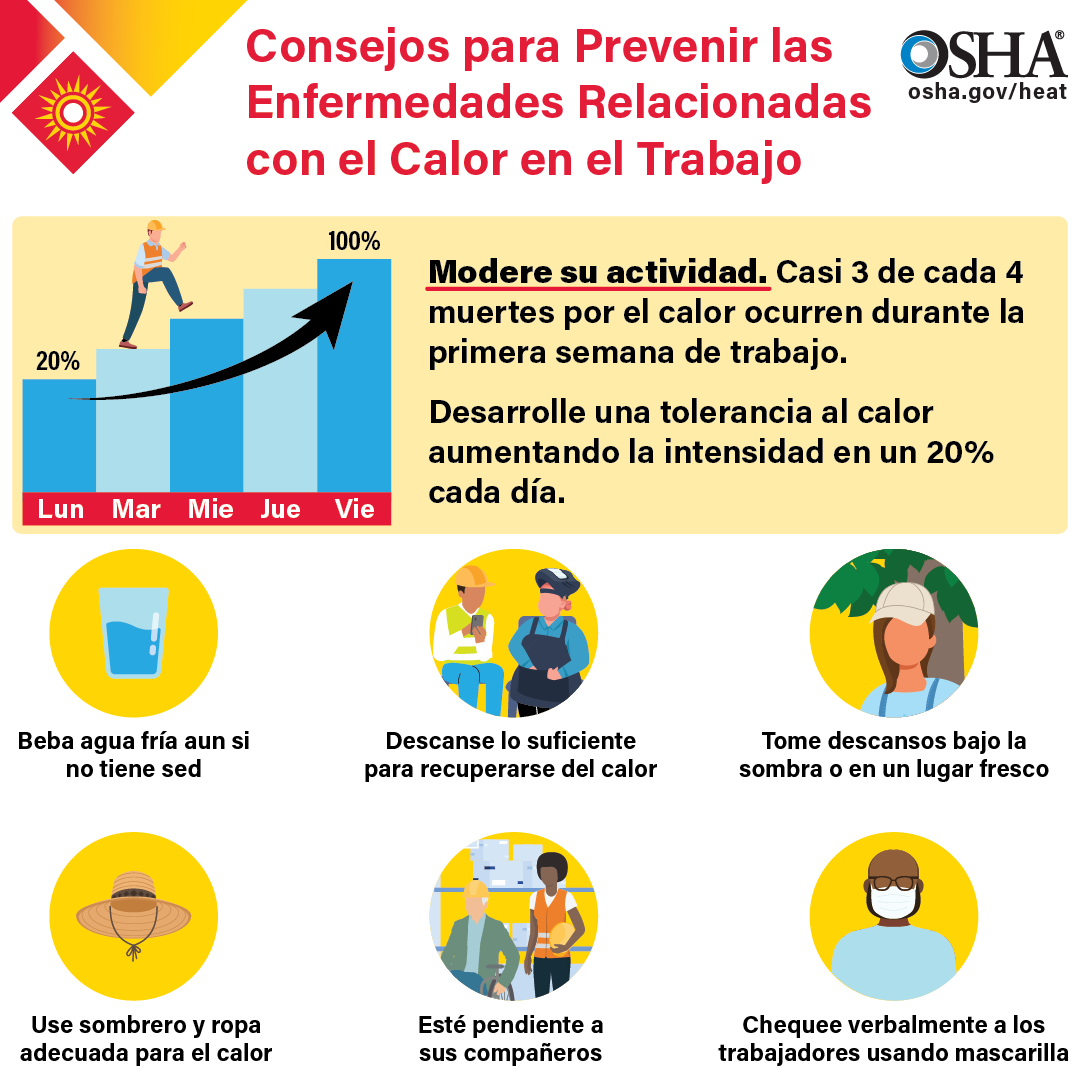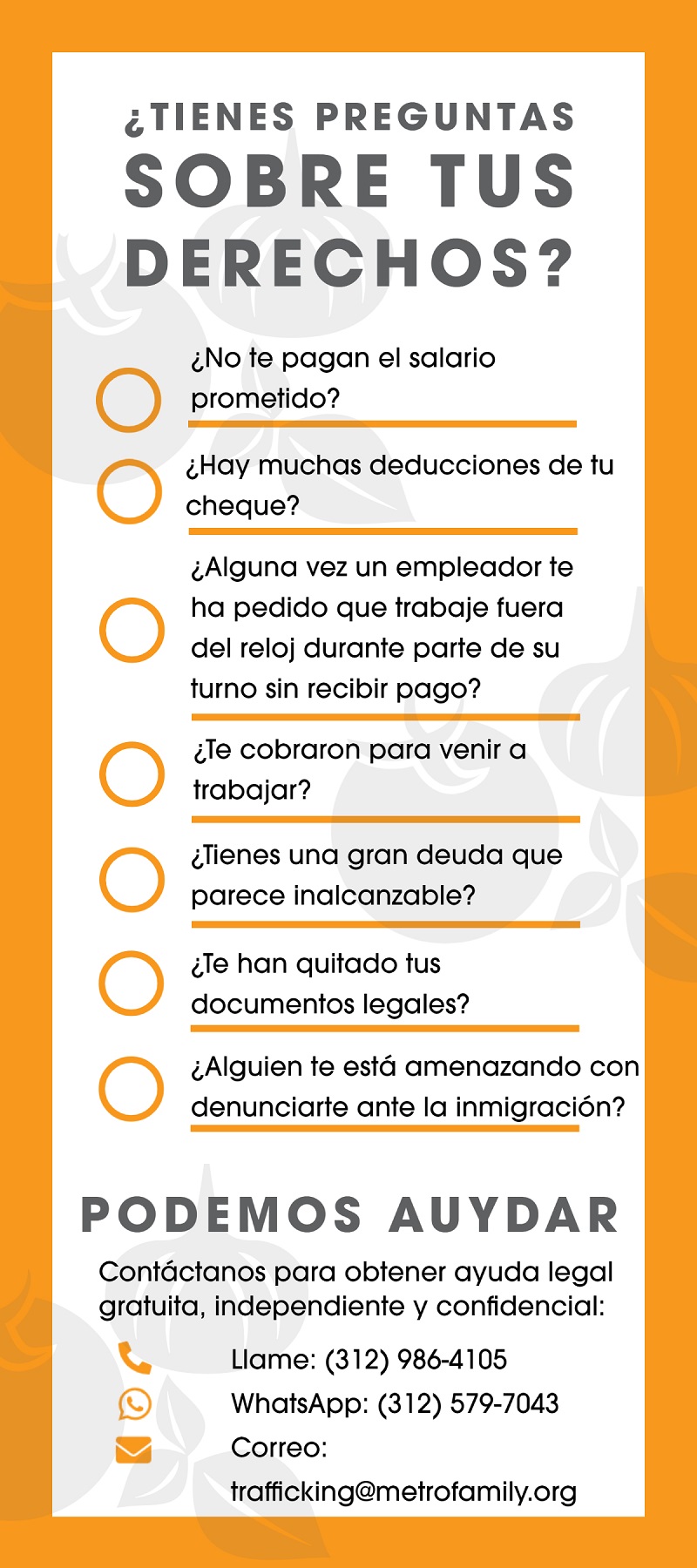


What would you do, if you were in Daniel’s shoes?
If Daniel’s story feels familiar to you, we can help!
Everyone in the United States has certain rights:
You have the right to:
- Be paid fairly
- Be free from discrimination and sexual harassment
- A healthy and safe workplace
- Be free from violence and exploitation
- Leave any abusive situation
- Exercise your rights under the law and report violations without fear of retaliation
- Receive protective equipment to do your job safely (your employer must pay for protective equipment without deducting the costs from your paycheck)
- Access to clean bathroom facilities and clean, safe drinking water
- Access to soap and clean water to wash your hands as needed, especially after handling pesticides/chemicals or foods treated with pesticides/chemicals
- Housing must be clean and safe. You must be allowed to leave your housing during non-work hours
Click on a topic below to learn more about your rights:
MINIMUM WAGE
You must be paid at least the minimum wage in the location where you work:
| Location | Minimum Wage | Effective Date |
| Minimum wage throughout the United States | $7.25/hr | |
| State of Illinois | $14.00/hour | January 1, 2024 |
| Cook County | $14.00/hour $8.40/hour for tipped workers |
January 1, 2024 January 1, 2024 |
| City of Chicago | $15.00/hour (small businesses with 4-20 workers) $15.80/hour (businesses with more than 21 people) |
July 1, 2023 |
ATTENTION: If you are a farmworker, you must be paid at least the minimum wage, even if you are paid “by piece” or “by acre”. Write down both the amount of buckets you’ve picked and the hours you worked. Both are important!
3/4THS GUARANTEE
The law guarantees H-2A and H-2B workers to be paid for at least 3/4 of the hours that were promised in your contract. If this is not the case and you stay until the end of your contract, you may have a claim to receive payment for the unworked hours.
You should receive a copy of your contract at the latest by the day when you apply for your visa to work in the United States. Among other things, the contract includes the following information:
- The period of anticipated employment: from the first day to the last day of work
- Hours of anticipated work: how many hours they anticipate that you will work every week
How do I calculate the 3/4ths Guarantee?
- 1) Count the number of weeks of anticipated work (from your contract)
- 2) Multiply this number by the number of work hours anticipated per week (from your contract)
- 3) Divide this number by 4
- 4) Multiply this number by 3
The total will be the minimum number of paid hours that you are guaranteed if you stay until the end of your contract.
|
EXAMPLE 04/26/2022–11/30/2022 = 31 weeks Total: 1,046.25 hours promised |
USE THIS CALENDAR
to track hours and wages
If you get sick or injured as a direct result of your job, you should receive reimbursement for medical care and you may receive payment from your employer to cover lost wages.
If you are injured on the job:
- Seek medical attention immediately. For serious injuries (e.g. head injuries, severe bleeding, fractured bones, third degree burns, chemical or pesticide exposure), go to the Emergency Room of the nearest hospital and call the ambulance if necessary.
- Notify your employer as soon as possible. They should have a formal process to provide you with workers’ compensation.
- If your employer does not answer your claim, denies your claim, or you need more assistance obtaining payments, contact an attorney who specializes in worker’s compensation.
It is illegal for an employer to harass or fire you due to having filed a worker’s compensation claim.
All workers, including undocumented workers, are protected by worker’s compensation.
Under the law, you have the right to:
- Receive training necessary to do your job safely in a language you understand
- Receive protective equipment to do your job safely, especially if you work around pesticides or dangerous chemicals (your employer must pay for protective equipment without deducting the costs from your paycheck)
- Access to clean bathroom facilities
- Access to clean, safe drinking water
- Access to soap and clean water to wash your hands as needed, especially after handling pesticides. chemicals or foods treated with pesticides/chemicals
If your employer provides housing, it must be clean and safe. You must be allowed to leave your housing during non-work hours.
PESTICIDES: KNOW YOUR RIGHTS
What is a pesticide?
- Pesticides are chemicals that are used to kill insects, weeds, rodents, and other pests
- You may see agricultural pesticides being applied by plane, tractor, backpack, or hand sprayer.
- Because they are designed to kill, pesticide exposure can lead to serious immediate and long-term health problems
It’s important to take all incidents seriously and immediately. Seek medical attention if you are exposed!
DANGERS OF EXTREME HEAT
Extreme heat or humidity increases your risk of heat-related illnesses, which can lead to serious medical conditions if left untreated. If you have to work outside while it’s hot, take extra precautions to keep yourself safe.
A job is not worth your life.
If you have work outside in extreme heat:
- Drink 1 cup of water every 15 minutes, or about 8 cone-shaped cups per hour. Don’t wait until you are thirsty to drink
- Wear and reapply sunscreen as indicated on the package
- Avoid alcohols and liquids containing large amounts of sugar
- Wear a wide-brimmed hat and loose, lightweight, light-colored clothing
- Use the buddy system: Monitor your coworkers and have someone do the same for you. Heat-induced illness can cause a person to become confused or lose consciousness
- Ask your supervisor if tasks can be rescheduled for earlier or later in the day to avoid midday heat
- Remember! Your employer must provide you with clean drinking water and toilet facilities located no further than ¼ mile away.
If you or a coworker become disoriented, lose consciousness, or are vomiting, call 911 immediately. This is a medical emergency.
 |
 |
 |
graphics via Occupational Safety and Health Administration
LABOR TRAFFICKING
Human trafficking is a hidden also because of the perception that “human trafficking” primarily refers to sexual exploitation. To be clear, trafficking is not just sexual exploitation, but rather includes forced labor of all kinds.
In the United States, men, women and children can experience labor trafficking. Construction workers, domestic workers, agriculture workers, landscapers and many other workers can experience labor trafficking.
EMPLOYERS WHO COMMIT LABOR TRAFFICKING MAY DO ANY OF THE FOLLOWING TO FORCE PEOPLE TO KEEP WORKING:
- Lie about the conditions of work to get someone to take a job (such as the number of hours of work, rate of pay, etc.)
- Deny the worker all or part of the wages they earn, often using intimidation to keep him/her quiet
- Force the worker to work long hours with no breaks
- Force the worker to work or live in substandard conditions
- Confiscate the worker’s important documents (such as passports)
- Threaten the worker with deportation to they complain or try to leave
- Threaten the worker or their loved ones with serious harm or death if they complain or try to leave
DEBT BONDAGE IS A SPECIFIC TYPE OF LABOR TRAFFICKING:
- A person agrees to have their work applied toward the payment of a debt
- However, the actual hours worked are not applied to the debt
- This results in the worker being forced to stay in the work situation, even if they want to leave, because of the debt
- This may happen where it seems like the debt never decreases or where extra charges are imposed that actually increase the debt
If you experience anything that sounds like the above conditions, it’s not your fault and help is available. Contact us immediately via phone at (312) 896-4105, via WhatsApp at (312) 579-7043 or email at trafficking@metrofamily.org for free and confidential legal advice. We can also connect you with other services you need.
If you are here on a temporary work visa (either H-2A), you have additional protections and rights. If you have any questions or concerns, you can always contact us via phone at (312) 896-4105, via WhatsApp at (312) 579-7043 or email at trafficking@metrofamily.org. We are here to help.
H-2A VISA HOLDERS HAVE THE RIGHT TO:
DECLARATION
- A written declaration (or contract) detailing all the terms and conditions of employment, including wages, hours of work, and any benefits
- Receive this information before applying for a visa and in a language you understand
- Be guaranteed work for at least 3/4ths of the hours promised in your contract (find more information under the “Minimum Wage” section)
WAGES
- Be paid at least 2 times per month at the rate specified in your contract
- A separate paycheck for each worker (even if several family members work for the same employer)
- Paystubs detailing how your pay was calculated, and how taxes and deductions were taken out
- To be informed and agree in writing to any deductions from your paycheck (taxes are different and should be taken out by your employer)
TRANSPORT
- Reimbursement for certain costs associated with your travel to the United States
- For workers who live in housing provided by their employer, you have the right to FREE, safe transportation between your housing and worksite.
You have other rights in addition to those listed above.
If you are hired through an H-2A visa, you have the right to receive reimbursement for your travel costs.
Arrival Travel Costs: If you work up to half of your contract, your employer must reimburse you the total cost of your transport and meals from your hometown to the worksite in the US.
Departure Travel Costs: If you work until the end of your contract, your boss must pay you the total cost of your transport and meals to return from the worksite to your hometown.
Visa Expenses: you must be provided or reimbursed for all visa, border-crossing, and visa-related fees in the first workweek of employment. Recruitment fees are illegal.
Follow these steps to obtain correct reimbursement:
- Save all of your receipts (visa, travel, lodging, and food expenses) that you accumulate during your travels
- Take photos of your receipts before turning them in to your employer to keep proof of your travel expenses
YOU HAVE THE RIGHT TO RECEIVE VISITORS
- If you want to have a visitor in your home during your free time, your employer cannot prohibit you from doing so, nor can they decide who is allowed to visit.
- There are many community organizations (like churches, healthcare clinics, or others) that frequently visit workers in their homes. It is possible that someone from our office will visit you to explain your rights and answer any questions you may have.
YOU HAVE THE RIGHT TO ENTER AND LEAVE YOUR HOUSING WHEN YOU WISH
- Your employer cannot prohibit you from leaving your house or from going to different places whenever you are off work.
ATTENTION H-2A WORKERS:
- Your employer MUST provide free housing for you
- No costs should be deducted from your paycheck
Your employer must also provide you with cooking facilities to make your own food, OR provide you with 3 meals per day (as of 2022, they may deduct up to $14 per day, but no more, for meals).
It is illegal to discriminate against someone in the workplace because of certain characteristics, including:
- Gender
- National origin
- Sexual orientation
- Religion
- Age
- Race or color
- Pregnancy or married status
Examples of illegal actions include:
- Frequent and sever jokes or comments about someone’s nationality, birthplace, skin color, race, culture or language
- Differentiating between “women’s jobs” and “men’s jobs”, especially if women receive a lower salary for a similar job
- Firing or forcing an employee to quit because she becomes pregnant
Employers cannot punish you for making a report about a discriminatory act.
There are laws that protect workers from sexual harassment in the workplace.
Prohibited conduct can include:
- Unwanted sexual attention
- Physical touching
- Comments of a sexual nature
- Non-verbal harassment (staring, winking, gestures)
- Requesting sexual favors
- And more
It is illegal for your employer to fire you, discipline you, or change the conditions of your work in retaliation for bringing a sexual harassment claim.
Remember that there are strict deadlines that apply to complaints of sexual harassment.
Recently, the state of Illinois approved a law that allows people without a social security number to apply for a driver’s license, called the Temporary Visitor Driver’s License (TVDL).
WHO CAN APPLY FOR A TVDL? Immigrants with a visa who cannot obtain a Social Security card can obtain a TVDL.
HOW LONG IS THE LICENSE VALID FOR? The license is valid for 3 years. To get a new TVDL after 3years, you need to reapply.
WHAT DOES THE LICENSE ALLOW ME TO DO? The TVDL is valid for driving only and cannot be used as a form of identification.
WHAT TESTS MUST BE PASSED? Must pass vision, writing, and driving exams.
WHAT DOCUMENTS ARE REQUIRED? Applicants must provide the necessary documents, including:
- Identity documents (with name and birthdate)
- Documents that contain your signature
- Documents proving your residence in Illinois for the last 12 months
- Documents that show your place of residence
Visit this website to learn about the TVDL and to make an appointment.
The majority of people in the United States have to declare how much wages they earn to the Internal Revenue Service (IRS) to determine how much taxes they owe. This is also true for H-2A and H-2B workers.
TAXES MUST BE FILED BEFORE APRIL 15 EVERY YEAR.
YOU NEED:
- Form W-2 for each job you have with a different employer. This form indicates how much you earned during the tax year and how much tax was deducted from your pay. You will file this with your tax return.
- A SOCIAL SECURITY NUMBER (SSN) OR INDIVIDUAL TAXPAYER IDENTIFICATION NUMBER (ITIN). H-2A and H-2B workers should apply for a SSN by contacting the Social Security Administration at 1 (800) 772-1213. If you cannot obtain an SSN, you should apply for an ITIN. Once you have your SSN, give your employer a copy.
- FORM 1040 for residents for 1040NR for nonresidents
- The help of an expert. Tax returns can be very complicated!
WHAT TAXES DO I OWE AS AN H-2A WORKER?
- H-2A workers must pay federal income tax. H-2A workers must agree in writing to have taxes withheld from their wages.
- H-2A workers do not have to pay Social Security or Medicare taxes. If these are deducted from your paycheck, seek help (see below).
DO YOU HAVE QUESTIONS ABOUT YOUR TAXES?
- The Volunteer Income Tax Assistance (VITA) program offers free tax assistance. To find a VITA site near you, call 1 (800) 906-9887 or visit https://irs.treasury.gov/freetaxprep
- See the Resource Directory section for additional free tax services
ATTENTION! Do not use a “Rapid Refund” or “Instant Refund” service. These are not actually refunds. These are high-interest loans from your tax preparer. When your actual refund arrives from the IRS, your preparer will keep a large percentage of it to pay for the loan.
The state of Illinois provides public benefits to certain individuals and families who meet eligibility criteria. These benefits include:
- Food Stamps (SNAP/Link) provide money (on a debit card) that may be redeemed at grocery stores for food
- Cash assistance (TANF) can help pay for food, shelter, utilities and expenses other than medical costs
- Healthcare coverage. In Illinois, Medicaid and AllKids cover healthcare for low-income people of all ages.
HOW DO I KNOW IF I QUALIFY FOR PUBLIC BENEFITS?
- Generally, you must have a low income and be a US citizen or have an eligible immigration status. However, if you are a migrant worker, there are some exceptions to this that may make you eligible. Visit gov - IL Application for Benefits Eligibility (ABE) ABE Home Page and click “Check If I Should Apply” to see if you qualify!
I AM UNDOCUMENTED. DO I QUALIFY FOR PUBLIC BENEFITS?
- You do not qualify for all benefits but are eligible for emergency medical assistance (through Medicaid) and the Supplemental Food Program for Women, Infants and Children (WIC). DHS in Illinois should not ask you for your immigration status if you apply for WIC.
- Even if you do not qualify for all benefits, you US citizen or permanent resident children may be eligible! You do not need to provide immigration status information or social security numbers for undocumented family members if you are applying for benefits for your eligible children.
WHAT IF I DO NOT SPEAK OR READ ENGLISH?
- The Illinois Department of Human Services (DHS) is required to provide you with a free interpreter. If you receive notices in English that you do not understand, your caseworker is required to interpret them for you.
WHERE ELSE CAN I SEEK MEDICAL HELP IF I DO NOT HAVE HEALTH INSURANCE?
- There are a number of free and charitable clinics throughout Illinois. Visit Clinic Directory – IAFCC (illinoisfreeclinics.org).
- Community Health Partnership of Illinois provides low-cost healthcare services to all. See the Resource Guide page under “Health” for clinic phone numbers.

COMMUNITY TRAININGS
[View our full Community Trainings playlist on YouTube]
RESOURCES
USE THIS CALENDAR
to track hours and wages
BROCHURES
- Everyone Has Rights [ENGLISH]
- Todos Tienen Derechos [ESPAÑOL]
- Tout Le Monde a des Droits [Français]
- Konojel Ri Winaq K’o Ya’tal Chke [K’iche]
- To Get Help | Si Quiere Ayuda
Domestic Workers
Farm Workers
Sex Trafficking
DIFFERENT TYPES OF TRAFFICKING
MIDWEST DIRECTORY
CONNECT WITH US
- Call: (312) 986-4105
- WhatsApp: (312) 579-7043
- Email: trafficking@metrofamily.org
DO YOU SUSPECT HUMAN TRAFFICKING?
National Human Trafficking Hotline
- 1 (888) 373-7888
- humantraffickinghotline.org


